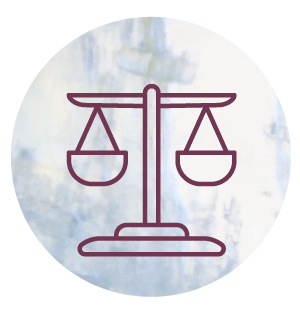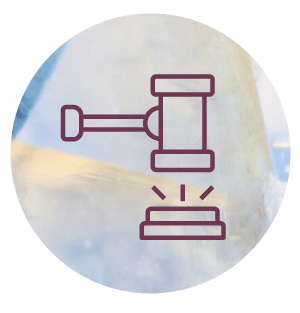Engaging in Self-Awareness: How Not to Judge When Helping Others

Social worker Zander Keig’s first job after earning his MSW was working in health care for homeless veterans at the Department of Veterans Affairs. Keig had interacted with people experiencing homelessness when he worked in an urban park in San Diego, but he knew he had to learn to work with them as a clinician.
“Getting that trauma-informed perspective, that basic lens of looking at why people are in the predicaments that they’re in and why they might be struggling or resisting, taking all those things into account is going to be really helpful,” said Keig, LCSW, who is the National Association of Social Workers’ 2020 Social Worker of the Year.
Keig credits the VA for providing training programs, including one through the Substance Abuse and Mental Health Services Administration (SAMHSA), which offers resources on working with people who are homeless from a trauma-informed lens.
Recognizing another’s circumstances, or looking at the world through their lens, is part of engaging in self-awareness. Self-awareness allows anyone providing assistance to do so in a nonjudgmental way that acknowledges every individual’s unique situation.
What Is Self-Awareness?
Merriam-Webster’s definition of self-awareness is “an awareness of one’s own personality or individuality.” Self-awareness is also a core competency area of Social Emotional Learning (SEL). SEL skills can empower people to help others thrive, according to the Collaborative for Academic, Social and Emotional Learning (CASEL).
“You cannot make a genuine, authentic connection if you are judgmental, critical and you have bias.”
—Mary Pender Green
Social workers and others in helping professions benefit from being self-aware because “there’s multiple perspectives we’re going to be bringing to and gaining from our education,” Keig said.
“Depending on what school you go to and which professors you have, there may end up being a conflict between your worldview and the lens you’re being taught to see your clients through.”
According to Keig, perspectives may be influenced by:
Life experience: Cultural background, religion and relationships.
Current situation: Financial obligations, health and family responsibilities.
Educational institution/program: University values, curriculum and affiliations.
Teachers/mentors/bosses: Philosophies, methods of practice and expectations.
Colleagues: Personalities, politics and interests.
To be better helpers, clinicians should understand what shaped their own attitudes and behaviors because “part of knowing where other people are coming from is also having a pretty firm understanding of where we’re coming from,” Keig said.

Why Is Self-Awareness Important When Helping Someone?
Helping professionals need to connect with their clients. Those connections are built on the ability to relate. “For social workers to be successful, self-awareness is the most important element because without being aware of how you’re feeling, it’s absolutely impossible to address the feelings of other people,” said Mary Pender Greene, LCSW-R, CGP, president and CEO of MPG Consulting in New York.
“You cannot make a genuine, authentic connection if you are judgmental, critical and you have bias,” Pender Greene said, adding that social workers and other helpers who have self-awareness are less likely to harm others because of stereotypical thinking.
However, she warned there can be a danger of oversimplifying the need for professional self-awareness, which should focus on the person who needs help, rather than their ethnicity or cultural background.
“I don’t like the idea of saying ‘cultural competence’ because in essence that is grouping people and saying all of one group is alike,” she said. “It’s about being aware and connected to the individual in front of you.”
How to Develop Self-Awareness
To nurture self-awareness and cultural sensitivity, professionals should explore their attitudes and assumptions with intention, Keig said. To facilitate their development in this area, they can consider these questions and what they address:
| Question | Purpose | Dig Deeper |
|---|---|---|
What assumptions do I hold about how the world works? | Identifies the basis of worldview. | Do I believe in a material world based on scientific findings vs. a spiritual world that exists outside of science? |
Am I open to alternative assumptions? | Determines ability to accept other worldviews. | Can I accept that people have different perspectives? |
What facts are the basis of those assumptions? | Facilitates understanding how different views can exist. | Can I help someone if they have a different perspective? |
Am I able to challenge my assumptions? | Aids in accepting that different factors influence people. | Have I considered all potential solutions? |
Am I able to dislodge my misconceptions? | Makes it easier to connect with others. | Can I avoid judgment to build trust with someone? |
Can I be agile in adopting a variety of viewpoints? | Allows me to be flexible. | What is the most effective solution? |
Can I revise my worldview to better align with reality? | Allows me to understand my limitations and set boundaries. | What is an attainable solution? |
What can I gain from therapy? | Identifies bias. | What unconscious biases and stereotypes do I have? |
“If our goal is to work with people in their environment, to treat every person with dignity and from a trauma-informed lens, and we can’t even get past some of these core value issues, we’re going to be expecting our clients and our patients to conform to our expectation of their life for them, and that takes away their agency,” Keig said.
Pender Greene said people in the helping professions would benefit from exploring resources to learn everything they can to develop self-awareness skills.
How Social Workers Can Improve Self-Awareness
Because social workers help solve other people’s problems, they have to juggle and anticipate all factors that impact potential solutions.
In addition to perspectives and their impact on self-awareness, social workers also must consider:

ETHICS
NASW’s Code of Ethics and specific workplace policies.

PRIVACY
Privacy rights and what environments (support groups, etc.) might affect them.

LAWS
Rules about advertising services, telehealth practices, licensure.
Keig and Pender Greene recommend social workers find support from peers by joining professional groups and organizations and actively seeking feedback from others.
“There are benefits to connecting with colleagues who are further along their social work journey than you,” Pender Greene said.
Social workers understand the benefits of sharing experiences.
“It’s part of the ethics that we agree upon as social workers that we need to be attentive to our colleagues because they’re the ones, ultimately, that are going to have a positive or negative impact on our clients, on our patients, on the consumers,” Keig explained. “So, we need to be attentive to each other, support each other, share resources with each other and educate each other.”
Professional Organizations for Social Workers
- Council on Social Work Education
- National Association of Social Workers
- Asian Pacific Islander Social Work Council
- Black Girls in Social Work
- The Coalition of Black Social Workers
- Latino Social Workers Organization
- National Association of Black Social Workers
- National Association of Puerto Rican Hispanic Social Workers
- National Indian Child Welfare Association
- The New Social Worker Book Club Facebook group
Self-Awareness Resources for Clinicians
- Building Self-Awareness, Center for Management and Organization Effectiveness: toolkit that focuses on building on strengths while sustaining improvement to help with personal growth and development.
- How to Improve Self-Awareness: 6 Ways to Learn About Yourself, Real Simple: methods range from journaling to identifying emotional triggers.
- Know Thyself: The Science of Self-Awareness, Stephen M. Fleming: psychologist on metacognition or thinking about thinking and how to use it to improve self-awareness.
- Self-Awareness, Harvard Business Review Emotional Intelligence Series: guide to understanding why self-awareness will help build more productive relationships at work.
- Self-Awareness: The Pathway to Professional and Personal Success, American Society of Administrative Professionals: article on the importance of seeking feedback and other strategies.
- Self-Awareness: A Quick Guide (PDF, 460 KB), The Myers-Briggs Company: handbook on why self-awareness is helpful for career development.
- Skills for Helping Professionals, Anne M. Geroski: primary text on helping skills for undergraduate programs in human services, social work and psychology.
- Three-Tiered Model Toward Improving Self-Awareness and Self-Care (PDF, 816 KB), American Counseling Association: helpful strategies recommended for counselors, using self-checks, self-talk and self-journaling.
- What Is Self-Awareness?, Understood.org: discussion on public and private self-awareness and tips on how to better tune into your feelings, thoughts and actions.
- Your Caring Heart: Renewal for Helping Professionals and Systems, Jaiya John: reflections relate to personal and professional renewal, compassion fatigue, burnout and more.

